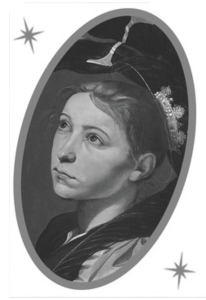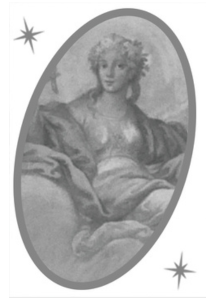Well, we're running out of letters, folks, as we continue our A to Z romp through the bracket. Today it's Ursula vs. Verna of Zurzach, as we head back to the 4th and 3rd centuries, respectively.
Yesterday, in the Lent Madness action, Sundar Singh to down Theoodre of Tarsus 63% to 37%. Also, yesterday, we understand some didn't receive their daily email. We're not sure what happened, as an equal number of you did. The good news (besides Jesus' resurrection), is that you can always go directly to www.lentmadness.org for your voting pleasure. Yes, you can completely eliminate the middleman and go directly to the source. Just a reminder in case this happens again (spoiler alert: it will at some point).
Oh, and don't forget to follow Lent Madness on our new Instagram account. Christian and Michael are serving up some great daily content over there.
Vote now!
Ursula
 There are different versions about the life of Ursula, depending on the source. While her tale—or legend—is simple, it may or may not be totally true. Nonetheless, her effect on society still stands.
There are different versions about the life of Ursula, depending on the source. While her tale—or legend—is simple, it may or may not be totally true. Nonetheless, her effect on society still stands.
Ursula may or may not have been born into royalty. She may or may not have been one of the eleven thousand virgins martyred together in Cologne, Germany, although there is no definitive date of her martyrdom. Oh, and it may have been eleven thousand, or it may have been eleven, virgins.
What is known is that Ursula was born in Britain between 300 and 400, give or take a few decades. Her name in Latin means “little she-bear.”
The legend surrounding Ursula claims that she was the daughter of King Dionotus of Dumnonia in southwest England. In the late fourth century, she and eleven thousand virgins sailed to meet up with her betrothed, who in the legend was the pagan governor Conan Meriadoc of Armorica.
When she landed in Gaul (France), she took off on a pilgrimage throughout Europe, heading for Rome. Joined by the pope and a bishop, the legend claims, she traveled to Cologne, which was controlled by the Huns. Ursula was expected to marry the leader of the invading Huns, who may or may not have been Attila himself. Oh, what ever happened to Conan?
Because of their faith, the virgins were beheaded, and Ursula was shot and killed with an arrow. This may or may not have happened in 383.
For someone whose history is sometimes questionable, her influence is unsurpassed. Ursula’s mark is quite evident in art, culture, and geography.
In 1493, on his second voyage to the New World, Christopher Columbus named the Virgin Islands in honor of Ursula and her companions. In 1520, Ferdinand Magellan named Cape Virgenes after them.
The Order of Ursulines, a religious community founded in 1535, is dedicated to Ursula. She was also the inspiration for many chants by the renowned Hildegard of Bingen.
Of great significance, Caravaggio’s last painting in 1610 was The Martyrdom of Saint Ursula, which is currently on display in Naples, Italy.
Churches in Spain and the Philippines conduct annual festivals to Ursula on October 21, replete with processions and colorful fashions.
Ursula is the patron saint of Cologne, archers, orphans, Rizal Province in the Philippines, the Ursuline Order of nuns, and schoolgirls. Ursula’s feast day is celebrated on October 21.
Collect for Ursula
Almighty and everlasting God, who kindled the flame of your love in the heart of your holy martyr Ursula: Grant to us, your humble servants, a like faith and power of love, that we who rejoice in her triumph may profit by her example; through Jesus Christ our Lord, who lives and reigns with you and the Holy Spirit, one God, for ever and ever. Amen.
Verena of Zurzach
 Verena, her name meaning “good fruit,” was born to a Christian family in third century Thebes and educated by the local bishop. When her cousin Maurice joined the Theban legion of about six thousand soldiers, she accompanied him. Relatives of soldiers frequently accompanied legions to provide medical care and prepare food.
Verena, her name meaning “good fruit,” was born to a Christian family in third century Thebes and educated by the local bishop. When her cousin Maurice joined the Theban legion of about six thousand soldiers, she accompanied him. Relatives of soldiers frequently accompanied legions to provide medical care and prepare food.
After securing a victory for Thebes, the emperor ordered the legion to worship idols. Being Coptic and worshipping the one true God, they refused. The emperor martyred the entire legion, including Verena’s cousin. Legend holds that Verena helped bury the martyred legionnaires. In her grief, and for her own safety, she fled to Switzerland.
While in Switzerland, she lived the life of an ascetic. She lived in a cave on the outskirts of town, near present-day Zurich, and became a consecrated virgin; that is, she was blessed by a bishop to live her life consecrated as a Bride of Christ, never to marry. She fasted and prayed daily. In her ministry to local community members, she began instructing people, especially young girls, on proper hygiene, medicinal herbs, personal care, and the Christian faith.
As her reputation grew, the local king became increasingly concerned about her influence. He ordered her imprisoned. During incarceration, her martyred cousin Maurice appeared to her to encourage her to remain steadfast in her faith. The governor became sick, and local Christians asked Verena to nurse him back to health. Once healed, the governor ordered Verena released from prison.
Verena again returned to her life as an ascetic, living in a cave, praying, fasting, and worshipping God. When her death came, legend holds that The Blessed Virgin Mary appeared to Verena, telling Verena about the peace and everlasting rest that awaited her in heaven. Incense filled the cave, and Verena died at the age of ninety-five.
In medieval Switzerland, she was one of the most venerated saints. Icons depict her holding a jug of water and a comb, symbols of her care for the poor and instruction of hygiene. Writings of the Coptic Church say of her that she met hostility with love, and her love won over the sword, and the blood of Martyrs over the arrogance of rulers.
Collect for Verena of Zurzach
Almighty God, whose will it is to be glorified in your saints, and who raised up your servant Verena to be a light in the world: Shine, we pray, in our hearts, that we also in our generation may show forth your praise, who called us out of darkness into your marvelous light; through Jesus Christ our Lord, who lives and reigns with you and the Holy Spirit, one God, now and for ever. Amen.
72 comments on “Ursula vs. Verena of Zurzach”
I voted for Saint Ursula because my friend Jaylen did the presentation today
Oh, I had to vote for the lost cause of Ursula! Let me count the ways:
1. Decades ago I lived for a year in the US Virgin Islands and never knew until today this cluster of island paradises (for those who visit; living there is another matter ...) was named for St. Ursula!
2. Last June, while visiting Cologne, I learned some details about her convoluted legend (how an M that was an abbr. for "martyr" was likely misunderstood as M for 1000).
To see photos from a basilica in Cologne dedicated to her, one could visit rhodaschuler.com and scroll down to the blog posts.
I voted for Ursula, admittedly mostly because her Day is the birthday of Ursula K. LeGuin, October 21, and I presume the Kroebers decided to follow the old tradition of naming their child for the saint on whose day she was born.
Ursula is another mythical saint. I’ll be glad when we get through the alphabet and get only real saints who did real stuff to help real people. Verena was the only possible choice for me.
She had me at the mention of hygiene and herbal medicine. I had to vote for Verena
Earlier we had Elizabeth of Hungary, a female saint who apparently did enjoy a happy marriage. For that matter, so did St. Elizabeth Anne Seton. Unfortunately, both had to endure the early loss of their marriage partners.
In penance for the Boston Protestants who burned the Ursuline convent here in 1834, one needs to vote for Ursula!
Voted for Ursula as a tribute to the honesty of Neva Rae Fox; would that more of the virgin-and-martyr legends were acknowledge as just that. (Or maybe not?)
But my main reason is that a classmate of all 12 years of school—a girl who was a prankster, a lanky tomboy with a great sense of good will and good humor and a frequent pain in the nuns’ posteriors—stunned us all at our 25th class reunion when she appeared and was an Ursuline sister!
St. Ursula won’t win today, but the Ursulines got Clare K., and they definitely won that one!
Ever since a dear friend died (of a medical error!) I have supported the school that set her off on the path to college and medical school and a distinguished career: the Academy of Mt. St. Ursula. I find it is named for a mountain in Slovenia, named in its turned for a very handsome Church of St. Ursula. {Scroll down in the Wikipedia article about the mountain, for a photo of the church.) That seemed reason enough to vote for Ursula, in memory of Dr. Elynore Cucinell.
As for complaints about virgin saints, I've been surprised at the number of wifely saints I've read about in Lent Madness. Some have to work around their husbands, e.g. who was it whose bread-for-charity turned into roses when her husband questioned her? and a few even had saintly husbands.
As for email alerts, I keep Lent Madness in my bookmark bar during the season and find it no trouble to open it myself.
Although I have been doing LENT MADNESS for many years I did not receive it this year. My daughter has sent me today's Post to which I responded.
I hope I will be back in circulation from today's date.
I wonder why I only received this this am, March 20and so never had a chance to vote.
Emails have been problematic this year
So much fun!